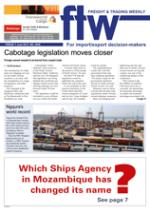The introduction of viable
short-sea shipping services
on the South African
coastline is on track with
the introduction of a range
of regulatory and other
measures.
This emerged at the
inaugural Ports and
Maritime Conference held
at The Boardwalk in Port
Elizabeth last week.
Commander Tsietsi
Mokhele, chief executive
of the South African
Maritime Safety Authority,
told the over 350 delegates
that legislation was being
drafted that would bar any
foreign-owned vessel from
offering cabotage services
between South African
ports.
The legislation would be
extended to cover offshore
services within the South
African territorial waters.
“Coastal trade must be
the preserve of the people
of South Africa,” he said.
He told FTW that the
legislation would be
published for comment
before the end of the year.
It was modelled on best
practice elsewhere in the
world which specifies
certain categories of vessel
and service. Large dredgers
and oil rigs, for example,
could be exempt.
The implementation
would start with the
government fleet and
state shipping operations.
“All project cargo for the
government should be
moved on South Africanowned
vessels,” he said.
Measures such as these
will provide the base load
required by South Africanowned
shipping companies.
Short sea shipping and
addressing the fact that
there are no South Africanowned
vessels serving the
country was one of the
underlying themes of the
conference.
“The Eastern Cape
has 800km of coastline
with three ports but is
currently not optimising
its locational advantage
to exploit the economic
advantage associated with
the maritime sector,”
Eastern Cape MEC for
Economic Development,
Environmental Affairs and
Tourism Mcebisi Jonas said
in his keynote address.
“Some 80% of global
trade takes place on
our oceans, with South
Africa accounting for
approximately a 3% share
of that global trade.
“Some 200 000 ships
pass through South African
ports annually, but SA has
only one registered ship.
“There is a skills demand
for 250 000 seafarers
globally, yet the country
has only 1000 seafarers and
trains less than 200 new
intakes per year.
“We are clearly not
taking advantage of our
strategic location within
the global maritime sector.
This must change,” he said.
Karl Socikwa, CEO of
Transnet Port Terminals
(TPT), listed one of the
key challenges facing the
country as being “poor”
global and regional
maritime connectivity.
Transnet National Ports
Authority (TNPA) chief
executive Tau Morwe said
South Africa – and Ngqura
in particular – had to grasp
the opportunity to serve
as a transhipment hub for
Africa.
“If you look at the
activities on the east
and west coasts, their
infrastructure probably
does not match South
Africa’s and cannot cater
for the latest deep-water
container vessels,” he said.
Mokhele added that
Ngqura should become
a consolidation point for
trade between the BRICS
nations (Brazil, Russia,
India, China and South
Africa).
INSERT
‘Ngqura should
become a
consolidation point
for trade between the
BRICS nations.’
CAPTION
Tsietsi Mokhele … ‘Coastal trade
must be the preserve of the people
of South Africa.’

